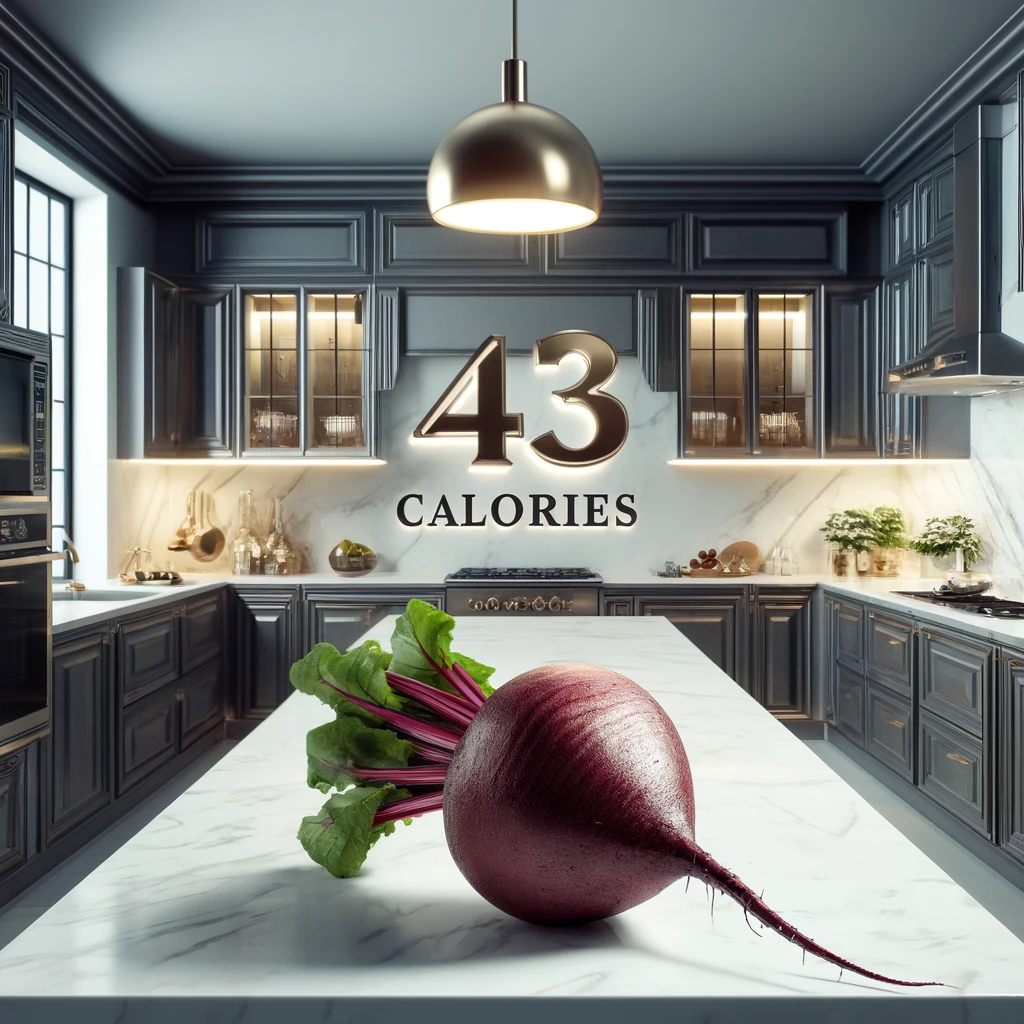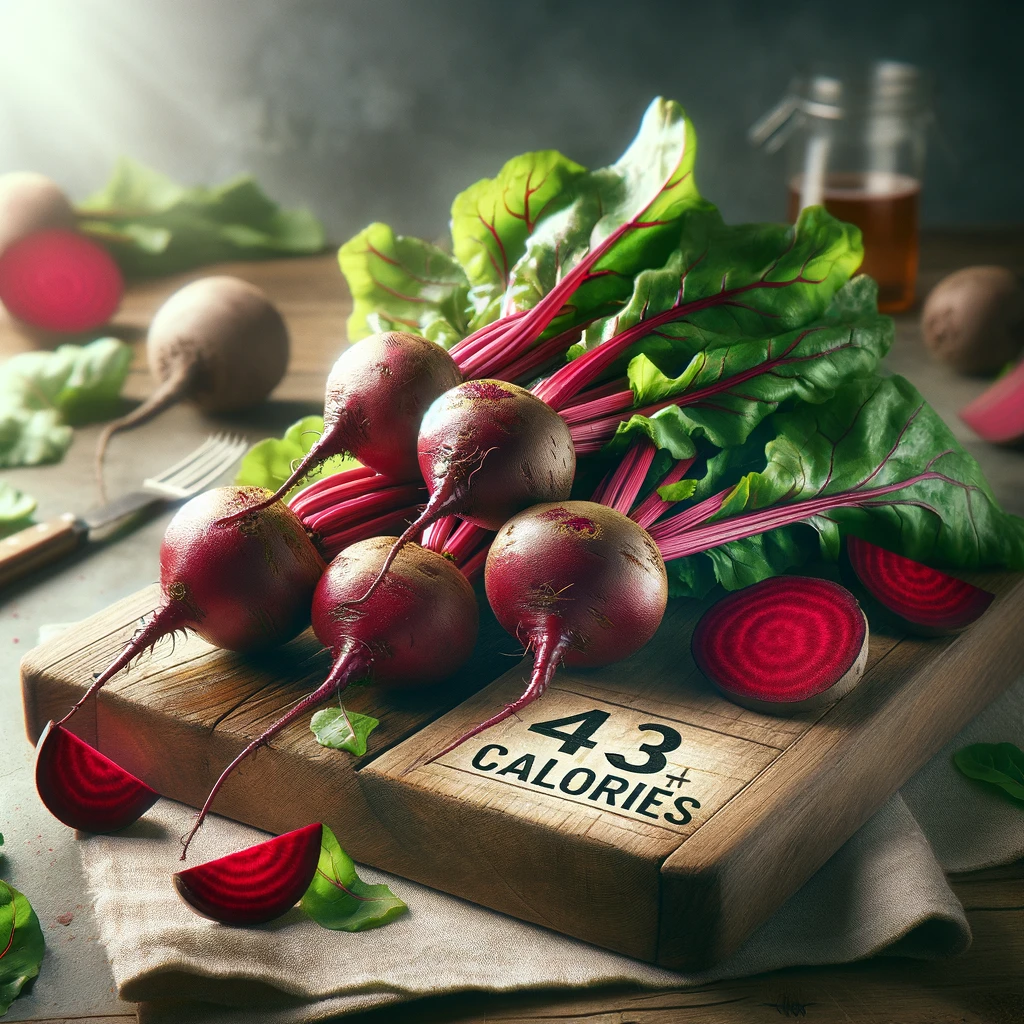How many calories are in a beetroot?
How many calories are in a beetroot? This question will have the best answer on our website and also the best way to cook it so it won’t lose value.
Beetroots, also known simply as beets, are vibrant and flavorful and a nutritional powerhouse. A common serving size of beetroot (about 100 grams of raw beetroot) typically contains approximately 43 calories. This makes beets a low-calorie food option, which is excellent for anyone looking to maintain a balanced diet without consuming too many calories.

You probably thought we would explain only How many calories are in a beetroot? Well, we will explain that beetroots are predominantly composed of water and carbohydrates. The carbohydrates in beets are mainly sugars—such as glucose and fructose—totaling about 9.56 grams per 100 grams. Despite their sugar content, beets have a low glycemic index, which means they release sugar into the bloodstream slowly and can help manage blood sugar levels.
Apart from their calorie content, beetroots are packed with vitamins, minerals, and antioxidants. They are particularly rich in folate, manganese, potassium, iron, and vitamin C. The red color of beets comes from betalain pigments, which have been studied for their potent antioxidant and anti-inflammatory properties.
Beetroots also contain dietary fiber (about 2.8 grams per 100 grams), which is beneficial for digestive health. Fiber helps to keep you full longer, can aid in weight management, and supports regular bowel movements.
How to Properly Cook Beetroot

Cooking beetroot without losing its nutritional value requires careful handling as heat can degrade some of its vitamins and antioxidants. Here are the best methods to cook beets while retaining most of their health benefits:
Boiling
Boiling is a common method for cooking beetroot, especially when you’re preparing beets to be eaten cold in salads or as a cooked snack. To boil beets:
- Wash the beets thoroughly.
- Place them in a large pot and cover with water.
- Bring to a boil and then reduce to a simmer.
- Cook until tender, which can take between 30 to 40 minutes depending on their size.
- Once cooked, you can peel the beets easily by rubbing the skin off under cold water.
When boiling beetroots, keep the skin on during the process to minimize the loss of nutrients.
Roasting
Roasting beetroots concentrates their flavors and sugars, making them sweeter and more intense. To roast beets:
- Preheat your oven to 400 degrees Fahrenheit (200 degrees Celsius).
- Scrub the beets clean and trim off the leaf stalks.
- Wrap each beet loosely in aluminum foil.
- Place on a baking sheet and roast until tender, about 45-60 minutes, depending on size.
- Let cool, then peel.
Roasting with the skins on helps preserve vitamins and minerals that might otherwise be lost during cooking.
Steaming
Steaming is another excellent way to cook beetroots to preserve their color and nutritional content:
- Prepare the steamer by boiling water at the bottom.
- Wash and slice the beets into uniform pieces for even cooking.
- Place them in the steamer basket, cover them, and let them steam until they are tender but still firm, usually about 15-20 minutes.
Steaming beetroots is quicker than boiling and can help retain more of the nutrients.
By using these cooking methods, you can ensure that beetroots retain their maximum flavor and nutritional benefits. Whether you boil, roast, or steam them, beetroots add a healthful and colorful boost to any meal.
Top 10 benefits of beetroot
Beetroot, a vibrant and nutritious root vegetable, is celebrated not only for its earthy flavor and vivid color but also for its impressive array of health benefits. Here are some key health benefits of incorporating beetroot into your diet:
1. Heart Health
Beetroot is rich in nitrates, which the body converts into nitric oxide. Nitric oxide helps to relax and dilate blood vessels, improving blood flow and lowering blood pressure. This can lead to a reduced risk of heart attacks, heart failure, and stroke.
2. Stamina Improvement
Studies have shown that the nitrates in beetroot can enhance physical performance by increasing oxygen use and blood flow. This makes it a popular choice for athletes looking to boost their endurance and performance. Drinking beetroot juice before an event is known to improve stamina and reduce oxygen uptake, which can enhance athletic performance.
3. Anti-inflammatory Properties
Beetroots contain pigments called betalains, which possess a number of anti-inflammatory properties. Regular consumption of beetroot can help reduce inflammation in conditions like osteoarthritis while also protecting cells from inflammation-induced damage.
4. Rich in Antioxidants
Betalains are not just anti-inflammatory; they are also powerful antioxidants. Antioxidants help reduce oxidative stress caused by free radicals, which can lead to chronic diseases like cancer and heart disease. Beetroot’s antioxidant properties help protect the body’s cells and improve overall health.
5. Cognitive Health
The high levels of nitrates in beetroot may also aid brain health. By improving blood flow to the brain, beetroot can help enhance cognitive function and potentially lower the risk of dementia. This is particularly beneficial in older adults, as blood flow tends to decrease with age.
6. Digestive Health
Beetroot is a good source of fiber, which is essential for a healthy digestive system. Fiber helps to regulate the digestive process, preventing and alleviating conditions like constipation, inflammatory bowel disease, and diverticulitis.
7. Detoxification Support
The compounds in beetroot aid the liver’s detoxification processes. Beetroot helps purify the blood and prevent liver diseases by stimulating liver cells and protecting the liver from oxidative damage and inflammation.
8. Cancer Prevention
There is promising research suggesting that beetroot’s antioxidant properties and compounds might reduce the risk of some cancers. For example, betalains have been studied for their ability to protect against colon cancer and skin cancer.
9. Supports Weight Management
Due to its low-calorie count and high fiber content, beetroot can be a beneficial addition to a weight-loss diet. The fiber in beetroot helps create a feeling of fullness for longer, reducing overall calorie intake.
10. Blood Sugar Control
Despite their sugar content, beetroots have a low glycemic index, which means they release sugars slowly into the blood and help maintain steady blood sugar levels. This makes them a beneficial vegetable for people with diabetes.
Incorporating beetroot into the diet can be done in various delicious ways, such as through salads, juices, roasted dishes, or even as a natural coloring agent in sweets. With its numerous health benefits, beetroot offers a potent combination of disease prevention and overall health enhancement.
References:


